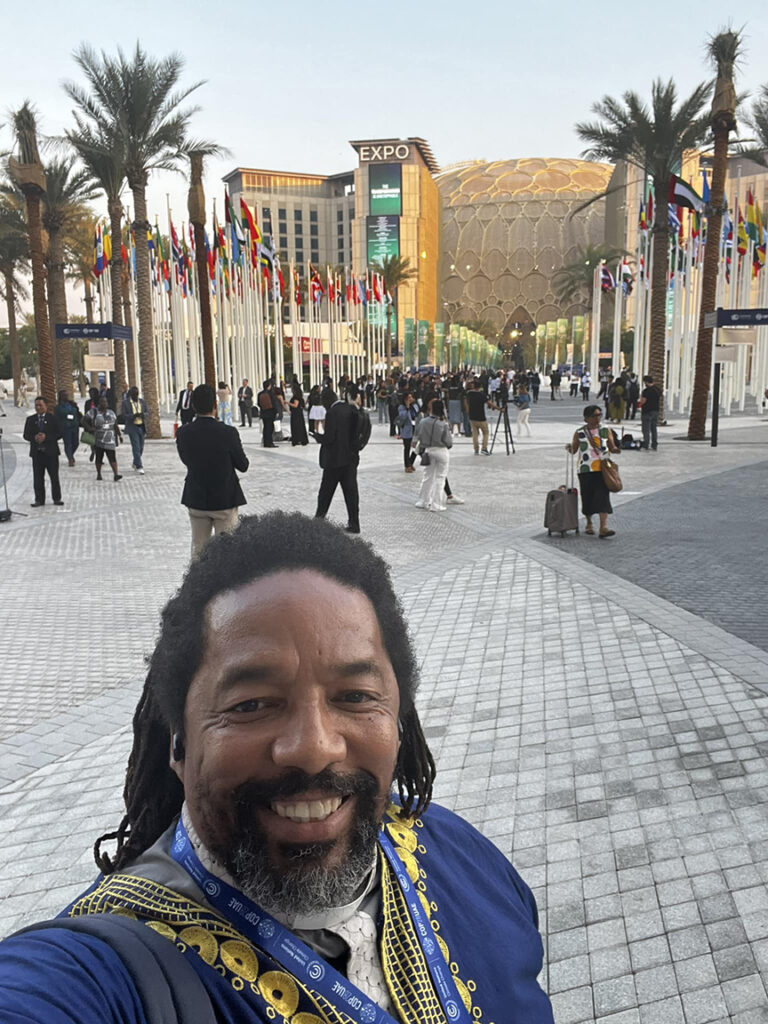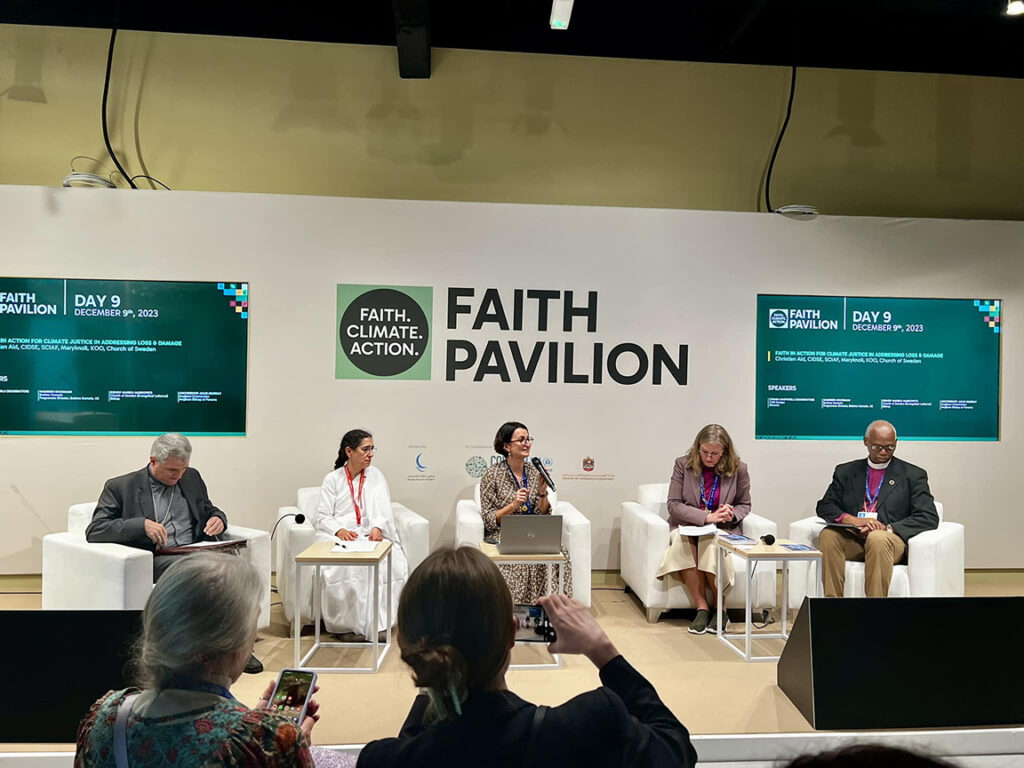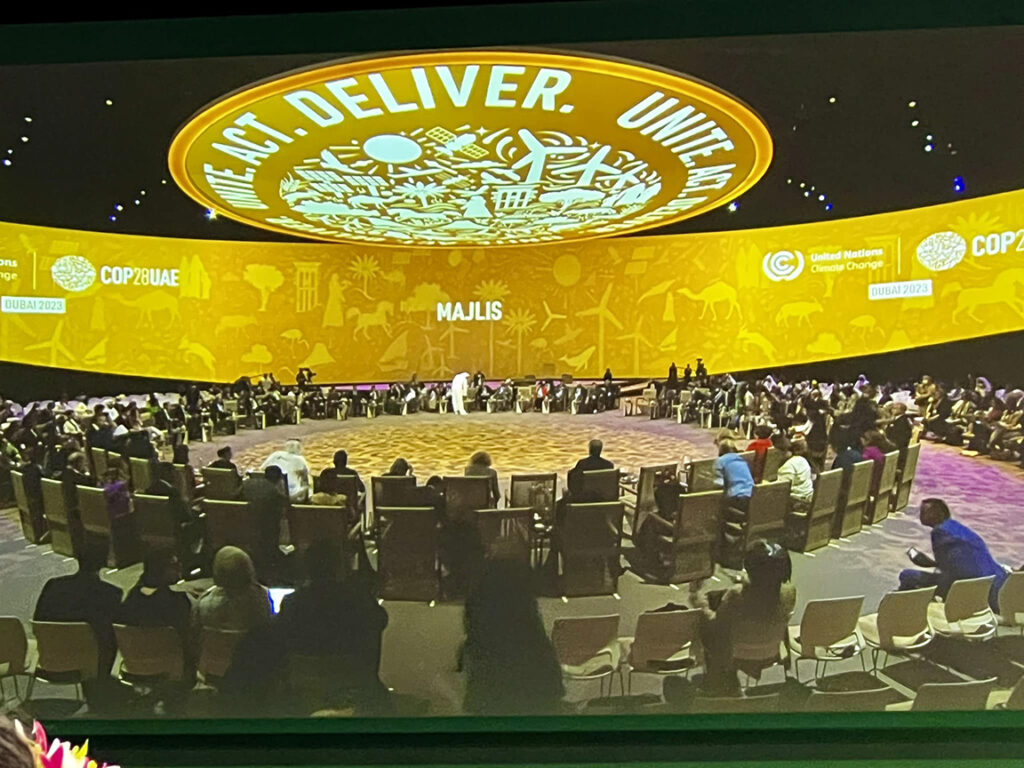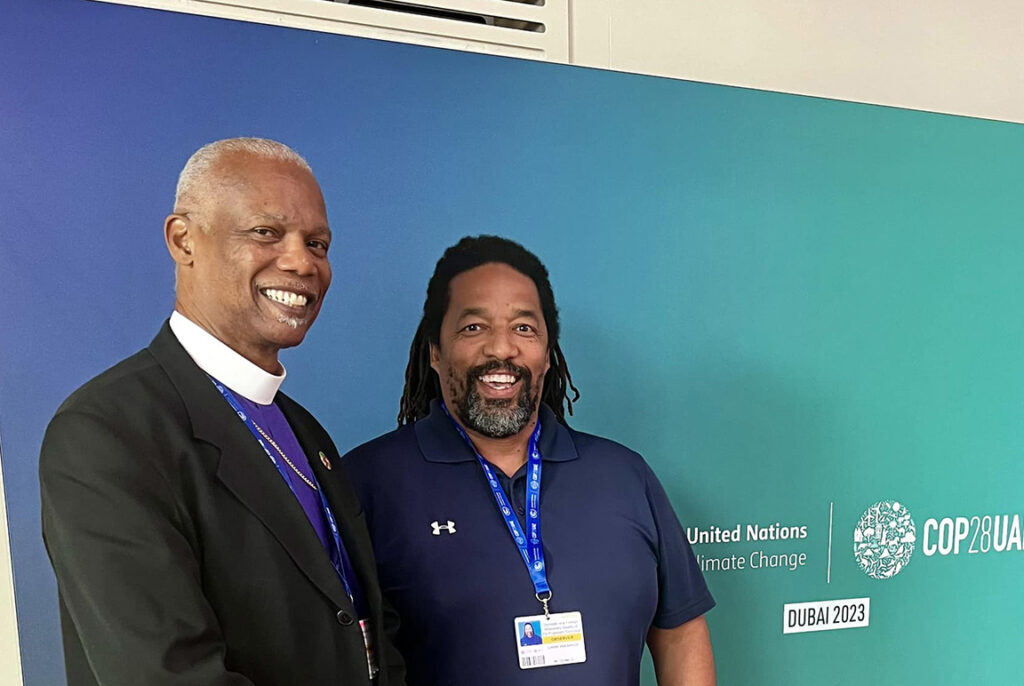
Lester Mackenzie visits the Blue Zone to observe the report of the Green Climate Fund to COP28 in Dubai. Photos: Courtesy of Lester Mackenzie
[The Episcopal News] The 28th Conference of the Parties of the United Nations Framework Convention on Climate Change, or COP28, included a first-time ever faith pavilion with an intentional focus on the voices of Indigenous people, but left the Rev. Lester Mackenzie wanting “mechanisms for actionable steps,” he told a January 8 regular meeting of the Bishop’s Commission on Climate Change.
Mackenzie, who serves as rector of St. Mary’s Church in Laguna Beach, was among 21 delegates representing the office of Presiding Bishop Michael Curry at the 2023 United Nations climate change conference. COP28 was held Nov. 30 through Dec. 12 in Dubai, United Arab Emirates. Mackenzie attended the second week of the conference in person, he said.
The Episcopal Church’s presence was tangible. “We kept sharing The Episcopal Church’s mission towards collective responsibility environment for future generations,” Mackenzie said. “It was a lot of work, a lot of late nights and a lot of relationship building. It’s wonderful because it affirmed just how far we’ve come as an Episcopal Church … and how cutting edge we are in this conversation in Los Angeles.”
He added: “I want to celebrate more how much we connect with real people on the ground in local communities, not only within our Episcopal Church, but … the Anglican Communion. We had so many people coming around. We don’t celebrate enough. We don’t make people aware about that enough. We need to do that more often.”
It is the ninth year the presiding bishop has convened Episcopalians in the urgent work of climate change advocacy in the global forum, and the second time Mackenzie has attended. He was a delegate to COP24 in Poland in 2018. Mackenzie also served on the General Convention Task Force on Climate Change and Environmental Racism.
“Our time with the Rev. Lester Mackenzie was so helpful,” said Canon to the Ordinary Melissa McCarthy, who chairs the commission. “He brought us great insights from COP28 and offered some inspiring ideas about where we can go as a diocese to make a difference in the reality of climate change.”
Locally, the commission in September 2023 hosted a Climate Change Summit, and the Los Angeles diocese, at its 127th annual meeting in 2022, adopted a resolution affirming The Episcopal Church’s Covenant for Creation Care.
Among other things, that covenant includes the goals to “grow our love for the Earth and all of life through preaching, teaching, storytelling and prayer; to stand alongside marginalized, vulnerable peoples, in order to advocate and act and repair Creation and seek the liberation and flourishing of all people; and to adopt practical ways of reducing our climate and other ecological impacts and living more humbly and gently on Earth as individuals, households, congregations, institutions, and as a diocese, as guidelines for diocesan action on matters of policy, administration, and governance concerning matters of creation care and climate change.”
In The Episcopal Church policy priorities for COP28, stakeholders were urged to embrace accelerating ambition; increasing support for communities experiencing loss and damage; protect human rights and affirm environmental justice in addressing adaptation and mitigation and fulfilling climate finance commitments and strengthening mechanisms.
The churchwide Covenant for the Care of Creation invites individuals, churches, dioceses, and Episcopal institutions to commit to deeper formation, public advocacy, and mitigation. According to a release from The Episcopal Church:
- “Over 2,000 households and congregations are measuring their carbon footprint via the Carbon Tracker.
- We have set and are working toward churchwide goals for achieving net carbon neutrality by 2030.
- We support rainforest protection in the Amazon and the Anglican Communion Forest initiative.
- We are planting “Good News Gardens” and partnering locally to improve access to good, affordable food.”

The Faith Pavilion at COP28 demonstrated the influence of faith groups on the U.N.’s deliberations.
Key COP28 takeaways
Mackenzie offered the following key takeaways from the gathering:
Faith Pavilion: a first for a UN Climate Change Conference, the Faith Pavilion brought together religious and other civil society representatives, Indigenous peoples, scientists, youth, and political leaders for conversations. The pavilion was hosted by the Muslim Council of Elders in collaboration with the COP28 Presidency, the United Nations Environment Program (UNEP), and a diverse coalition of global partners including the Interfaith Center for Sustainable Development, the Episcopal Diocese of California, the International Partnership on Religion and Development (PaRD), the Peace Department, and more than 50 faith organizations.
“Everyone was at the same table at the same time, even though we were acknowledging we have to change the way we keep interacting between COPs,” Mackenzie said. The Faith Pavilion issued calls to action and transformation, and for responsibility and recommitment, so all people might live in dignity. Others may sign on to the Call to Action.
“This was one of the few times where the Indigenous voices were really visible, really present, really powerful,” said Mackenzie.
The gathering also concluded with both loss-and-damage and climate finance agreements that would help vulnerable developing countries deal with climate change and transitioning to renewable energy, and a global “Stocktake” enabling countries to assess their progress toward meeting the goals of the Paris Agreement.
The Paris Agreement, adopted at COP21, set as a goal limiting global warming to 1.5-degrees Centigrade above pre-industrial levels by the end of this century. Current science indicates that greenhouse gas emissions must peak before 2025 and decline by 43% by 2030 to limit global warming to 1.5-degrees Centigrade.
“We are not winning,” Mackenzie said, echoing the sentiment that goals have not been met by many nations. “The United States is the biggest polluter,” he added.

With other observers, Mackenzie attended meetings of the COP28 delegates.
“Carbon Colonialism,” where developed nations purchase land masses in other countries to earn carbon credits, was also concerning, he said. The United Arab Emirates reportedly has made deals that cover “a fifth of the land mass of Zimbabwe, 10% of Liberia, 10% of Zambia and 8% of Tanzania, amounting to a total are the size of the United Kingdom,” for carbon credits toward the Paris Agreement but that also could be considered a permit to pollute, according to a report by The Guardian. The UAE was reportedly working on a similar deal with Pakistan.
Also discussed:
- Preserving the “blue economy” or coastal wetlands and oceans, accelerating marine-based solutions – “which means sustainable ocean management, coastal resilience”
- Improving transportation and housing – “How do we better plan for vulnerable populations within urban planning within climate adaptation?”
- A net-zero food plan involving an increased $3.4 billion in funding for climate-smart food systems and agriculture, and another $389 million to support food producers and consumers.
- AI, or “artificial information processing – “Asking, how do we build and use AI in helping predict climate patterns, and better improving agriculture?” Mackenzie said. “And how do you then use that to take big chunks of data, looking at disease detection, building resilience, and addressing, again, the digital divide through language inclusive technology.”
Looking ahead to COP29, slated to meet Nov. 11-24 in Azerbaijan, Mackenzie said he hopes to cultivate relationships developed at the 2023 gathering, especially regarding such concerns as: “How do we make this actionable? Who gets to decide how the funding is best allocated—which is why our voices on the ground are very valuable. We bring a wonderful reminder of humanity.
“I can’t emphasize more the Indigenous voices that were present, our interreligious conversations, the young emerging voices, the wisdom of our elders, and all of us affirming how do we, how can we nurture our bonds of affection between COPs?”

Mackenzie meets with fellow Anglican Communion representative Archbishop Julio Murray, bishop of Panama and primate of Iglesia Anglicana de la Region Central de America.
Mackenzie has been rector of St. Mary’s since 2016, and previously served at St. Matthew’s Church, Pacific Palisades, and St. John’s Cathedral, Los Angeles. He was a three-time deputy to General Convention from the Diocese of Los Angeles (2012, 2015 and 2018), and was chaplain to the House of Deputies in 2015, 2018 and 2021. He is president of the diocesan Standing Committee and has also served on the Corporation of the Diocese and as an examining chaplain.
A native of South Africa, Mackenzie is an accomplished musician, public speaker and executive coach. Prior to seminary and ordination, he was part of the 2002 Hands in Healing pilgrimage led by the late Rt. Rev. J. Jon Bruno.
The Climate Change commission meets again at 7 p.m. on Monday, Feb. 12, via Zoom.
